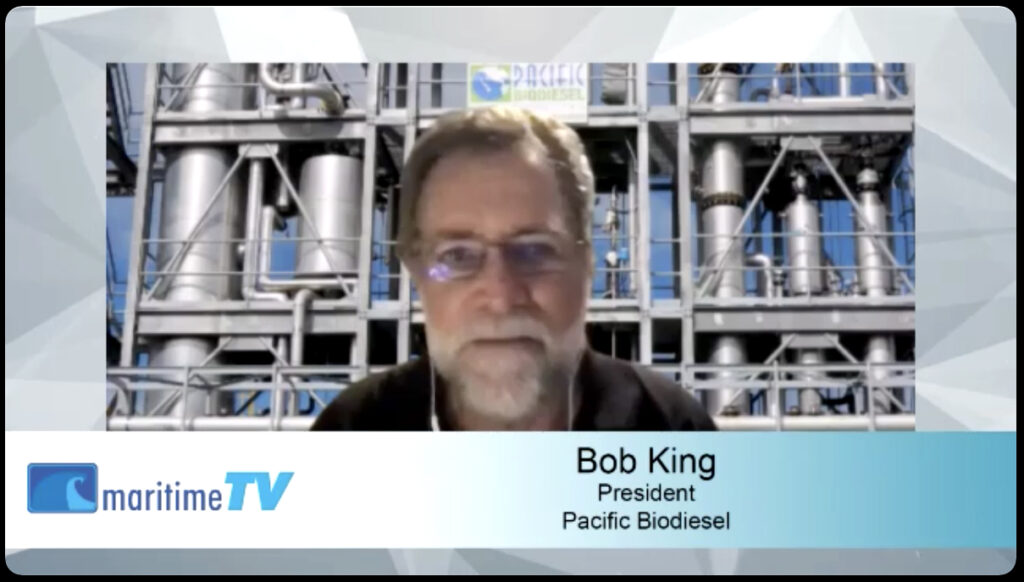FREQUENTLY ASKED QUESTIONS
Are biodiesel and vegetable oil the same thing?
No, biodiesel is produced through a chemical process called transesterification which converts oils and fats of natural origin into fatty acid methyl esters (FAME). Combustion of vegetable oil without conversion to biodiesel will lead to soot accumulation and deposits that may lead to power loss and engine failure. See What is Biodiesel.
What is in biodiesel?
Biodiesel is made through a chemical reaction between natural oils and alcohol, followed by purification. Biodiesel can be made from nearly any naturally occurring vegetable oil or fat. The most frequently used oils by Pacific Biodiesel facilities are used cooking oil, tallow, yellow grease, poultry grease, cottonseed oil, and soybean oil.
Learn more about what biodiesel is here.
Learn about biodiesel and sustainability here.
Do I need to do any modifications to my diesel vehicle to use biodiesel?
If your car was made prior to 1993, the rubber fuel lines will probably have to be replaced. One of the major advantages of using biodiesel is the fact that it can be used in existing diesel engines without negative impacts to operating performance. Biodiesel is the only alternative fuel for heavyweight vehicles that does not require any special injection or storage modifications.
It is important to note that newer diesel vehicle models of Volkswagen, BMW and Mercedes (2007 or later) have a fuel system that can create a fuel/oil dilution in the diesel engine, whether diesel or biodiesel fuel is used. Over time the engine oil could be diluted by the fuel if certain precautions are not taken. One recommendation is to ensure you are running your diesel engine regularly. And, if you use 100% biodiesel in these vehicles, you must change the oil at least every 3,000 miles and check your oil level regularly (this is not an issue with these vehicles using biodiesel blends, such as B20). Ram trucks and all GM vehicles do not have this issue. Contact our biodiesel fuel experts here if you have any questions.
Will using biodiesel void my warranty?
The U.S. Department of Energy explains in its Biodiesel Handling & Use Guide: “Federal law prohibits the voiding of a warranty just because biodiesel was used. The biodiesel would need to be shown as the cause of the failure. If an engine experiences a failure caused by biodiesel use (or any other external condition, such as bad diesel fuel), the damage will not necessarily be covered by the OEM’s warranty.”
DOE Biodiesel Handling and Use Guidelines
Can I run biodiesel in my gasoline engine?
No, biodiesel can only run in conventional compression-ignition (diesel) engines!
Can I go back and forth between petroleum diesel and biodiesel?
Yes, you can use biodiesel and diesel fuel interchangeably, as well as blended.
Will I need to change my fuel filters more often when using biodiesel?
Biodiesel is a solvent. It will clear many diesel deposits that have accumulated in your fuel tank. This may cause initial fuel filter clogging but continued use of biodiesel will not cause an increased frequency of filter changes.
How does the fuel efficiency of biodiesel compare with petrodiesel?
Vehicles running on biodiesel get virtually the same MPG rating as vehicles running on petrodiesel. Learn more.
Is biodiesel good for my engine?
Yes, biodiesel can actually extend the life of your engine. Biodiesel has superior lubricating properties that reduce the wear of vital engine parts.
How do the emissions of biodiesel and petrodiesel differ?
Using biodiesel instead of petrodiesel will significantly reduce unburned hydrocarbons, carbon monoxide, and particulate matter from tail pipe emissions. It will also virtually eliminate sulfur oxides and sulfates which are major contributors to acid rain. Nitrogen oxide emissions may slightly increase, but can be remedied with newer low-emission diesel engines. Learn more.
Where can I find biodiesel in my state?
A complete list of fueling stations that carry biodiesel can be found by clicking here.
Does biodiesel contain diesel fuel?
Pure biodiesel, B100 (100% biodiesel) does not contain petrodiesel. Biodiesel can be blended with petrodiesel and is frequently sold as B20 (20% biodiesel, 80% petrodiesel blend) or B5 (5% biodiesel, 95% petrodiesel blend).
What do I need to know about using biodiesel in my boat?
As a biodegradable, non-toxic advanced biofuel, biodiesel is ideal for marine application. Biodiesel is safer to handle and eliminates the risk from environmentally hazardous fossil fuel spills. To use biodiesel for your diesel engine-powered boat, follow these tips:
- Ensure your fuel hoses are made with biodiesel compatible materials. DO NOT use natural rubber, butyl rubber or various nitrile rubber materials as these may degrade when used with 100% biodiesel, which is a solvent. (note: fuel fittings and connectors made with these materials are acceptable due to their small surface area in contact with the fuel). DO use compatible elastomers such as Viton, PVC-Nitrile, Flouro-elastomers, Teflon, Silicon or Nylon. There are a wide variety of compatible hose types available for 100% biodiesel that are US Coast Guard certified. Contact our fuel team here if you have any questions.
- Microbial activity has always been an issue with petroleum diesel fuel. High moisture content in the fuel can lead to microbial growth in fuel tanks that can lower horsepower output and may result in engine damage. In contrast, Pacific Biodiesel produces premium distilled biodiesel which is extraordinarily clean and dry. To avoid maintenance issues, ensure your fuel is always stored properly without exposure to moisture. Microbial activity can be temporarily treated with biocides (used sparingly); but it is important to fix any water leaks to avoid exposing the fuel to water.
To learn more about biodiesel for marine application, watch this presentation by Pacific Biodiesel President Bob King on Maritime TV.

Pacific Biodiesel Founder and President Bob King was a guest speaker for the Earth Day edition of DigiMariner VI, a production of Maritime TV, in support of the United States Merchant Marine Academy. His presentation covers a wide scope of topics specific to the marine audience.
Click here for the full presentation.
